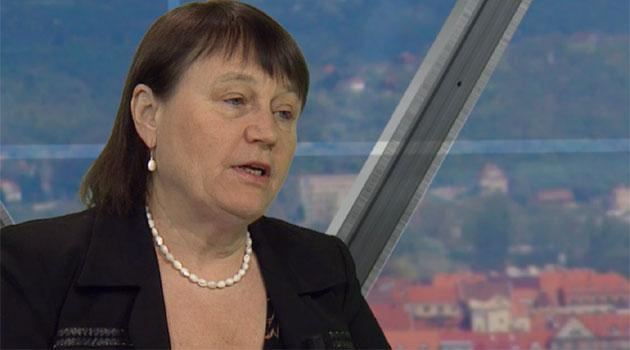In her role as ombud, Anna Šabatová wants to contribute to the creation of a functional social housing system in the Czech Republic and to win more respect from politicians for the Final Statements issued by the Office of the Public Defender of Rights. Speaking on the Czech Television (ČT) program "Questions with Václav Moravec", she said her predecessor, Pavel Varvařovský, may sometimes have relied too much on written communications with politicians, and when that wasn’t effective, he may have reconciled himself to failure "a bit early".
Šabatová intends to communicate in person with bureaucrats and politicians in such cases. At the same time, however, she emphasized that it is thanks to the first ombud, Otakar Motejl, and to Varvařovský that the office is so trusted by the public today.
Czech MPs elected Šabatová the Public Defender of Rights in mid-February. She would like to expand some of the office’s powers.
Šabatová has previously stated that she would welcome the opportunity for the ombud to be able to recommend the Constitutional Court abolish particular laws, especially those that may be discriminatory. However, that cannot happen without the passage of an amendment to that effect.
Speaking on ČT, Šabatová said that one "candidate" for such abolition by the Constitutional Court is the law proposed during the previous session of Parliament by Ivana Řápková, the former mayor of Chomutov. The legislation makes it possible for local authorities to ban a person’s residency on their territory for up to three months should they be convicted of having committed certain misdemeanors repeatedly.
The ombud says it is first necessary to determine whether the norm is being made use of at all in practice. "We need to know whether this is a dead letter or whether people’s fundamental rights are being violated as a result of it," she said.
Šabatová was nominated by members of the Czech Senate for election to the post. The other candidate was the former MP for the Czech Social Democrats and current Deputy Ombud, Stanislav Křeček, who was proposed by Czech President Miloš Zeman as well as by members of the Czech Senate.
MPs elected Šabatová during a second round of secret voting. She received the lowest possible number of votes necessary to be elected.
Shortly after taking office, she and Křeček clarified through remarks in the media what kinds of topics the ombud should or should not make public statements about. Křeček commented to the website Lidovky.cz on the current situation in Ukraine, stating that the Czech media have been distorting their reporting on the situation there and that the demonstrators have been taking up arms against a democratically elected government.
Šabatová responded by saying the ombud’s office should not make statements about matters unrelated to its own work. Speaking on ČT, she added that in her opinion she has succeeded in reaching agreement with Křeček on this point.
The ombud considers one of her most important tasks to be creating a social housing system that defines what social housing is, who will be able to claim it, and who will be responsible for its operation. Šabatová believes the lack of such a system is leading to the infamous problems with residential hotels, where socially needy people are paying overpriced rents for poor accommodations.
However, Šabatová also reminded viewers that the laws necessary for the creation of social housing are not adopted by the ombud, but by the Government and Parliament. Another matter she would like to help promote while in office is a requirement for local authorities to inform citizens that a two-phase administrative proceedings is not the end of their options for seeking justice.
It is possible after such a proceedings to file an administrative action with the Regional Court, and if that is not successful, to file a cassation complaint with the Supreme Administrative Court. "People are not informed [of this], the administrative bodies are not required by law to instruct [citizens] in this," the ombud said on ČT.
The mission of the ombud, by law, is to protect citizens from the inaction or poor decisions of the state administration. Should the ombud determine that a specific body has made an error, the office has the power to call for a correction, and if the error is not corrected, the highest possible sanction currently available to the ombud by law is that it would then publicize the case.
